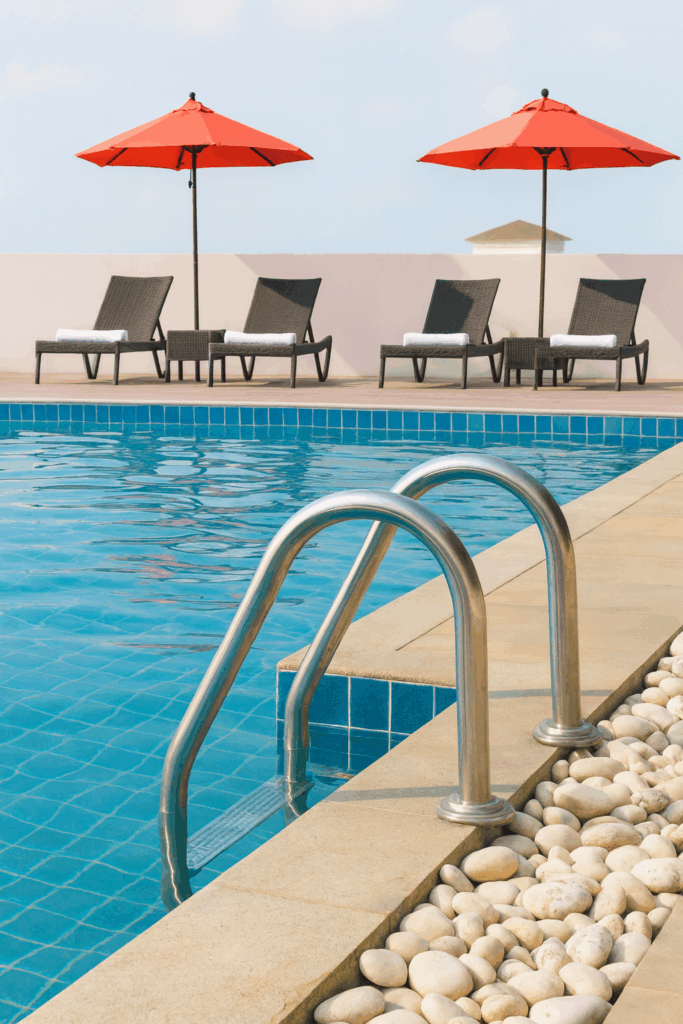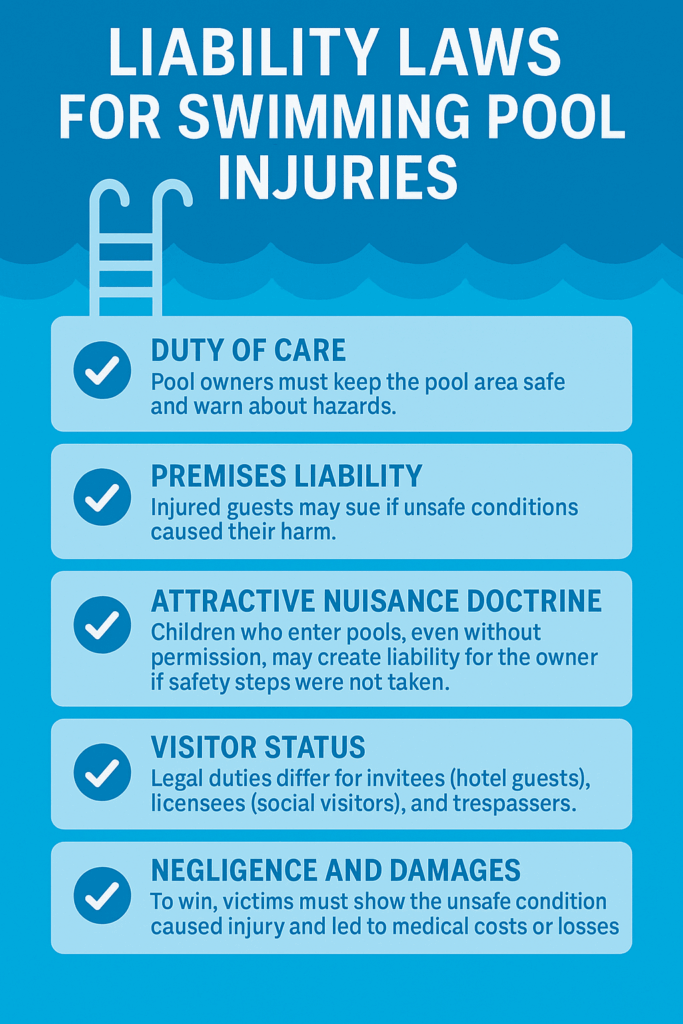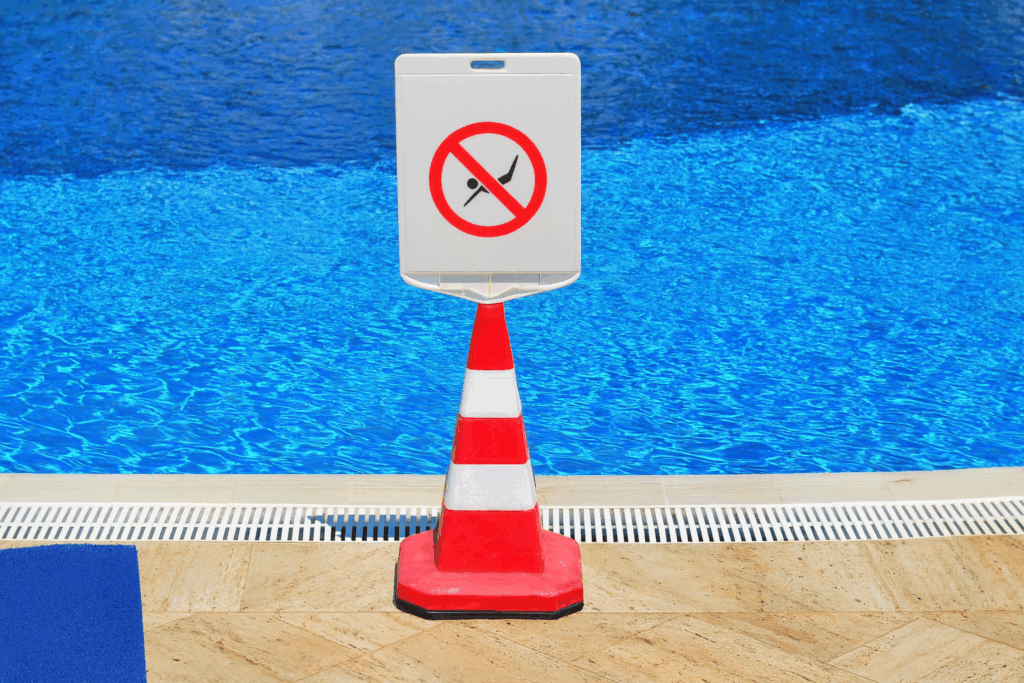
What are the liability laws for swimming pool injuries? They vary by state but generally fall under premises liability. Here are the main points:
What are the liability laws for swimming pool injuries? Understanding what are the liability laws for swimming pool injuries helps victims and families know when legal action may be available.
Drowning remains one of the leading causes of unintentional death in the United States, especially among children. Between 2019 and 2021, the U.S. Consumer Product Safety Commission (CPSC) reported that an average of 358 children fatally drowned in pools or spas each year, with another 6,500 children visiting emergency rooms annually for pool-related injuries.
Even with measures such as four-sided fencing around residential pools, self-latching gates, safety covers, proper supervision, and widespread access to swim lessons, risks remain. When protections are neglected and someone is injured or killed, questions of liability arise.
Below, we explain how liability laws apply to swimming pool accidents, who may be held responsible, and what legal options are available to victims and their families.

Pools may be a delight, especially for kids, but courts often look at what are the liability laws for swimming pool injuries, treating them as high-risk features under premises liability.
Even with measures such as four-sided fencing around residential pools, self-latching gates, safety covers, proper supervision, and widespread access to swim lessons, risks remain. When protections are neglected and someone is injured or killed, questions of liability arise. For example, the CPSC’s Safety Barrier Guidelines for Home Pools outline recommended safeguards that can reduce risks and are often referenced when determining liability.
In many jurisdictions, pools are treated as inherently hazardous conditions on property. That legal framing raises an owner’s duty to anticipate foreseeable harm, inspect regularly, correct unsafe conditions promptly, and control access—especially where children are likely to be present.
Insurers flag residential and commercial pools as higher-risk features. Common outcomes include higher premiums, required safety attestations, exclusions for non-compliant pools, and recommendations (or requirements) for higher liability limits or an umbrella policy.
One serious incident can implicate medical payments coverage, premises liability limits, and, in severe cases, the owner’s personal assets. This is why knowing what are the liability laws for swimming pool injuries is critical for pool owners and insurers alike.
Yes, but the success of a lawsuit depends on the circumstances of the accident and how what are the liability laws for swimming pool injuries apply in your state. Injury claims involving pools generally fall under premises liability law, which evaluates the owner’s duty of care and whether it was breached.
Here are the main factors courts consider:
When courts evaluate what are the liability laws for swimming pool injuries, they usually require an injured person to show four things:
The duty of care often depends on the legal status of the person using the pool:
Pools are especially dangerous for children, who may not recognize the risks. Under the attractive nuisance doctrine, owners can be liable if a child is injured (even if the child entered without permission) where the danger was foreseeable and reasonable steps were not taken to secure the pool. Fences, locked gates, and pool covers are common safeguards expected by courts.

The type of liability depends on who owns or operates the pool and how what are the liability laws for swimming pool injuries define their responsibility. Key categories include:
Private pool owners are expected to keep their pool and surrounding area reasonably safe. That means fixing hazards like broken ladders, loose tiles, or cloudy water; storing chemicals securely; and posting warnings about risks that may not be obvious. If children are invited over, supervision and secure access become especially important.
In some states, violating pool safety codes (like fencing requirements) can automatically be considered negligence.
For shared pools in apartments, condominiums, or HOA communities, owners and associations must maintain the pool in a safe, code-compliant condition. This includes hiring qualified maintenance companies, inspecting equipment, tracking water quality, and enforcing safety rules.
Even if a contractor is hired, many states consider the duty “non-delegable,” meaning the property owner or association remains legally responsible if something goes wrong.
Hotels, gyms, waterparks, and other commercial pool operators owe the highest duty of care to guests. They must regularly inspect facilities, train staff, monitor water clarity, control bather loads, post safety signage, and prepare for emergencies. Health department regulations and industry standards set the baseline for what courts consider “reasonable” operations.
Manufacturers can also be held liable if defective products like ladders, drains, or pumps cause injuries. Builders and installers may face claims if the pool was designed or constructed in violation of safety codes or industry standards. These cases often rely on expert inspections and maintenance records to prove the defect.
Pool owners at every level must follow building, health, and electrical codes. Missing barriers, faulty wiring, poor water circulation, or inadequate safety equipment can all be used as evidence of negligence. Violations may not only lead to lawsuits but also to government fines, enforcement actions, or facility closures.
A pool accident can change lives in an instant. Understanding what are the liability laws for swimming pool injuries can help families know when legal action may be possible, and when to call Thompson Law for help. When negligence plays a role, you deserve answers and accountability. Thompson Law is here to guide you through the claims process, protect your rights, and fight for the compensation your family needs to move forward.
Contact us today for a FREE CONSULTATION and take the first step toward justice.

Serving clients in:
Swimming pool injury cases are typically handled under premises liability law. Owners must maintain safe conditions, warn of hidden dangers, and comply with local pool safety codes. If negligence is proven, the owner or operator may be held financially responsible.
Homeowners, landlords, HOAs, businesses, hotels, gyms, and even product manufacturers may be held liable depending on whether unsafe conditions, poor supervision, or defective equipment caused the injury.
Yes. Courts often consider pools an attractive nuisance, meaning owners can be liable if a child enters and is injured, even without permission, if reasonable safeguards like fences or locked gates were not in place.
Useful evidence includes photos of unsafe conditions, maintenance records, safety inspection logs, witness statements, medical bills, and proof of code violations or missing barriers.
Deadlines depend on the state. In many states, victims have two years to file a personal injury claim. If the injury happened on government property, notice-of-claim rules may shorten the deadline to as little as six months.
Yes. If the property owner failed to secure the pool with proper fencing, gates, or covers, they may be sued under premises liability and the attractive nuisance doctrine.
Yes. Liability laws for swimming pool injuries are complex and vary by jurisdiction. An attorney can help investigate the accident, preserve evidence, meet deadlines, and maximize compensation for medical expenses, lost wages, or wrongful death damages.
Sí. Hablamos español. We provide bilingual support so Spanish-speaking clients have full access to our attorneys.
Contact us today for a FREE CONSULTATION!






Thompson Law charges NO FEE unless we obtain a settlement for your case. We’ve put over $1.9 billion in cash settlements in our clients’ pockets. Contact us today for a free, no-obligation consultation to discuss your accident, get your questions answered, and understand your legal options.
State law limits the time you have to file a claim after an injury accident, so call today.